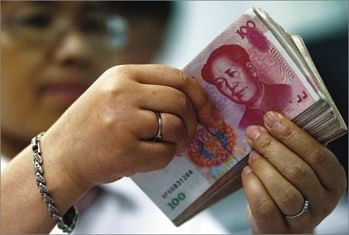China's secretive money manager opening up

An employee counts yuan banknotes at a bank in Suining, Sichuan province, on Friday. Photo: REUTERS
It was a quiet day in US debt market trading one day last December but participants felt something was amiss. Treasuries were selling off but the driving force behind the swoon remained a mystery.
An answer soon emerged: Traders were passing around a days-old news story containing a quote from a Chinese central bank official.
Zhu Min, the deputy governor of the People's Bank of China, had told an audience in Beijing that it would be "difficult" for foreign governments to buy US Treasuries as the US current account deficit shrank and the supply of dollars overseas decreased.
The 10-year US Treasury note yield rose 14 basis points that day even though, on the surface at least, Zhu was simply pointing out a mechanical reality for central banks trying to manage their currency reserves. Still, US-based traders saw a veiled warning; a potential signal that China would pull back from its heavy purchases in the Treasury market.
Traditionally, the Chinese government has dealt with the enormity of its influence on US Treasuries by deploying elaborate smoke screens to hide its movements, infusing its Wall Street moves with an air of paranoia and heavy-handed control.
But banks and investors that work closely with China are seeing more sophistication in its fixed-income strategy, perhaps in a bid to become more transparent.
"They're in a league of their own in terms of size and growth rate of investment, so it behooves them to have that kind of predictability in their actions so as to not jeopardize their position in the process," said Robert Tipp, chief investment strategist at Prudential Fixed Income in New York.
China holds $900.2 billion in US Treasuries.
As a result, Tipp said, "They are not a speedboat; they are an epically large tanker. It's very easy to see that everybody else in the water is watching them. If that boat has any sudden movements it could be very destabilising for the markets."
A few recent actions by China's currency manager, the State Administration for Foreign Exchange (commonly called SAFE) -- an arm of the PBOC -- suggests to Wall Street that China is beginning to manage public expectations by relying less on ironclad secrecy and more on the nuanced telegraphing of purpose.
Last week, SAFE posted a series of questions and answers -- in Chinese -- on its website designed to reassure the world of its continuing interest in US Treasury securities.
"Any increase or decrease in our holdings of US Treasuries is a normal investment operation," read the answer to a question about whether SAFE would ever use its currency reserves as a "nuclear weapon.
In addition to this public gesture, SAFE's behaviour on Wall Street, though it remains very secretive, may be shifting.
SAFE is a client prized above all others by primary dealers, the 18 firms in charge of buying US debt directly from the government and selling it into the marketplace. This is big business that requires discretion.
The two dozen bankers Reuters interviewed at the large Wall Street firms, as well as lawyers and others that deal directly with China in the Treasury market, asked not to be quoted by name, fearing they would be fired or their firms would lose the Chinese government's business.
The bankers said China masks its Treasury market moves by employing different organisations to buy Treasuries on behalf of the Chinese government. While SAFE is the biggest, it is not the only one.
At times, smaller entities such as state-owned banks will ask for research or a view on a particular purchase and then a large agency such as SAFE will carry out that purchase. One banker at a primary dealer likened these test purchases to pilot programs, adding that they were an example of how centralised the decision-making is behind China's Treasury purchases.
Treasury purchasing orders are handed down from Beijing, and bankers at primary dealers say they have met more often with money managers in China than with anyone from SAFE in New York. Dealers who have visited Beijing describe SAFE's money managers as polite, professional, and at times tight-lipped.
One dealer noted that while Wall Street analysts and economists easily offer their opinions about the state of financial markets and the US economy, SAFE officials almost never reveal their investment outlook.
SAFE's New York employees try to keep public contact to a minimum. A foreign exchange analyst who answered the phone at the New York SAFE office was friendly, and passed a curious Reuters reporter on to a US Treasury strategist. But the situation quickly soured as the strategist, after a quick exchange in Chinese with another person in the room, slammed down the phone.
Part of the motivation for SAFE's secrecy is the threat of public disapproval in China. Criticism flared two years ago after China Investment Corp., another government investing arm, bought $3 billion in U.S. real estate firm Blackstone's shares at $31 each only to see them plunge below $10 a year later.
"The CIC's initial $3 billion investment in Blackstone has come under intense criticism in China for the disappointing performance of the company's shares since its listing," the Chinese financial news service Xinhua Financial reported in October 2008.
"The Chinese used to brag, 'We have $200 billion in foreign exchange. We have $500 billion. We have $1 trillion.' They don't brag anymore," said Derek Scissors, a China analyst at the Heritage Foundation in Washington.

 For all latest news, follow The Daily Star's Google News channel.
For all latest news, follow The Daily Star's Google News channel. 




Comments